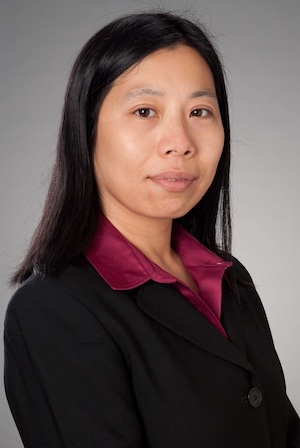By Laela Zaidi
As smartphones have become ubiquitous, many of us take for granted the leaps in technology that now appear every year or even every few months with our handheld devices. We think of USB cables, touch screens, and batteries as the routine work of engineers and product designers. Rarely, however, do we think of the intricate legal processes that can make or break a product’s success and availability. H. Annita Zhong is an attorney with deep experience in these systems whose work has been consequential in the telecommunications industry.
In January of this year, Zhong was named one of 95 lawyers in the Los Angeles Business Journal’s list of “Minority Leaders of Influence.” This recognition comes on the heels of a significant win for Zhong. As a principal member of a team at Irell & Manella (where she is a partner), she helped secure a $506.2 million jury award for PanOptis in an infringement case against Apple. The high-profile trial was the first in-person jury trial in the country during the pandemic. Zhong successfully litigated on behalf of PanOptis in a second-phase bench trial, in which an equitable defense is tried solely in front of a judge.
Zhong has also achieved success before the Patent Trial and Appeal Board, an adjudicative body within the U.S. Patent and Trademark Office (USPTO). The Board hears patentability questions raised by third parties, known as AIA trials (named after the America Invents Act). There are three main types of AIA proceedings: inter partes review, post-grant review, and covered business review. Despite the notorious difficulty of these types of proceedings, Zhong has successfully defended 29 inter partes reviews filed by four major handset manufacturers as lead counsel for Fundamental Innovations Systems International LLC. Some of the suits had major ramifications on advancing USB charging and the availability of wall adaptors with fast-charging abilities.
What is most striking about Zhong’s rise in patent litigation, however, is her unlikely entry into the field. Originally, she was a scientist specializing in chemical engineering. Then, unexpected circumstances forced her to change careers.
Born in Shanghai, China, Zhong began her university studies in Australia. After one semester, she elected to begin her undergraduate studies over at MIT in order to pursue chemical engineering and chemistry, citing the flexible curriculum and opportunities in the United States as reasons to transfer. After graduating from MIT in 1996, where she was inducted into Phi Beta Kappa, she pursued a Ph.D. in chemistry at CalTech. Upon completion, she moved to upstate New York and conducted research in semi-conductor packaging materials and catalysis. In the laboratory, she discovered that she had developed a sensitivity and allergic reaction to chemical materials.
“I was looking for ways out of the laboratory role while still doing something connected to the science and engineering that I had been doing for decades,” Zhong said. “It was sad, and there was some fear. English is not my first language, and being a lawyer requires a lot of language skills. There was a question in the back of my mind: Am I doing the right thing? Is this the end of my career or the beginning of my career?”
Zhong quickly realized her knack for law, however, during her clinics at Yale Law School, where she assisted nonprofit organizations with economic development projects in disadvantaged communities. After graduating, she returned to California, where she joined Irell & Manella, a law firm with a national reputation.
Despite departing the lab, Zhong credits her scientific training for giving her a leg up in the legal realm: “At the end of the day, if you only have a legal theory but no facts to back it up, it’s not going to withstand scrutiny. How to find the relevant finds and how to build a story to support your theory…I do think the engineering research I did helped with that.”
In addition, she credits her liberal arts background at MIT with preparing her for life in the United States. “At MIT, I took classes in political science and economics. Those really broadened my perspectives and horizon…especially with what is going on in American societies. For example, my first exposure to gender and racial issues was when I was in those political science classes,” she noted.
Laela Zaidi earned her Bachelor of Arts in religious studies from Hendrix College, where she was inducted into Phi Beta Kappa in May 2018. Hendrix College is home to the Beta of Arkansas chapter of Phi Beta Kappa.




